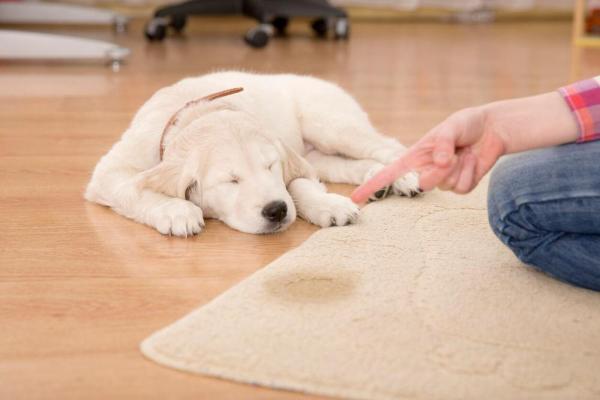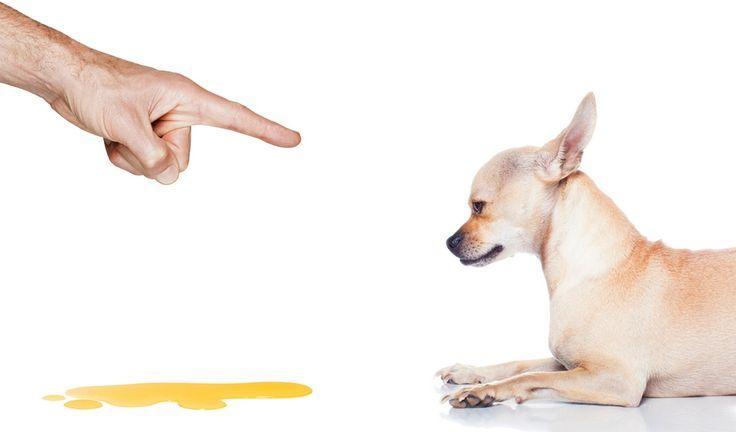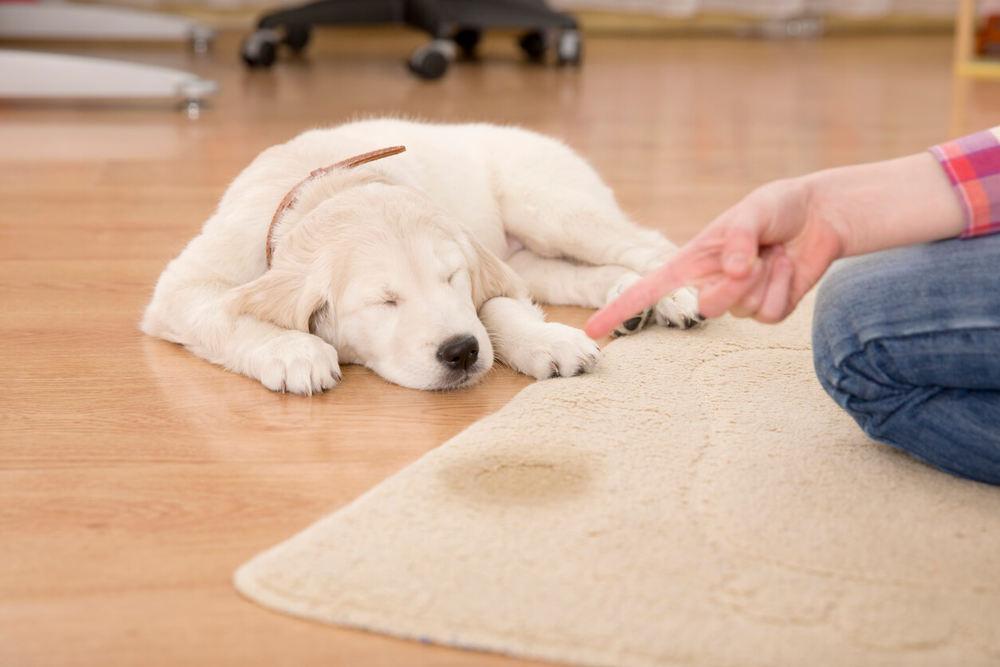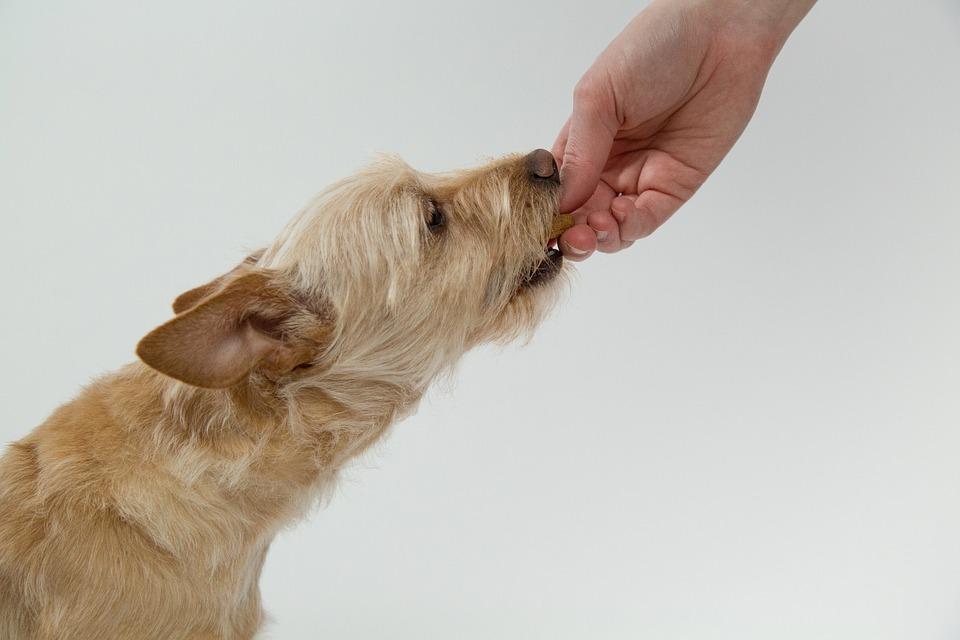Why Does My Dog Pee When Is Scared?



See files for Dogs
Recently adopted puppies or adult dogs may urinate after you scold them for inappropriate behavior, which can be surprising and distressing to their new owners. This behavior is called submissive urination and occurs when a dog pees in response to fear or anxiety. This is more common in puppies that are just gaining confidence, but can also occur in adult dogs. If you notice your dog exhibiting this type of behavior, it is best to contact a dog behavior specialist, such as an ethologist or dog trainer, who can advise you and make an appropriate assessment.
In this AnimalWised article, we explain why your dog urinates when you scold them, and what you can do to improve this situation and their well-being.
What is submissive urination?
Urination is a physiological need of all mammals that regulates the amount of fluid in the body and also rids the body of toxins and metabolic residues. Many animals, including dogs, also urinate for social reasons, such as to mark their territory or to communicate information about their identity to other animals. Dogs may also urinate out of submission when faced with a negative event that causes fear, stress, or even panic. It is not uncommon for rescued dogs to pee when they are greeted, when approached by a person, when punished, or when they have experienced rough treatment in the past.
Submission is a form of animal behavior in which an individual attempts to avoid injury from a dominant member of its species through appeasement maneuvers. In dog packs, dominance is a key factor in survival and in establishing a hierarchy. Each pack has a specific leader. This leader is usually referred to as the pack leader, alpha dog, or alpha male (in most cases, a female dog is the alpha male).
This natural behavior will also occur in your home. Ideally, a well-trained adult dog should be able to obey its owners without fearing them. However, coercion, punishment, or inconsistent methods used by inexperienced dog owners lead to insecure dogs with behavior problems. If your dog is constantly showing signs of fear or submission, then something is wrong. This type of behavior typically indicates that the bond between owner and dog is not functioning properly or is non-existent.
If your dog urinates while playing or greeting you, but does not adopt a submissive attitude, then they are exhibiting a different behavior, excitement urination.

Why does my dog pee if its scared?
Dogs of all ages may urinate for a variety of reasons: when they are frightened, when their owners come home and greet them warmly, when they hear a loud and violent noise, etc. In more extreme cases, a dog may urinate when approached by their owner or others dogs. Urination may be the result of submission, fear, or excitement.
Usually, the dog will act out in some way before they start urinating out of fear after a scolding. Some examples of this early signs are: staying still or refusing to move, showing teeth or other aggressive behavior, putting ears back or ears to head, avoiding direct eye contact, etc.
A dog that first pees out of fear may begin to do so frequently in response to punishment, submission, and the appearance of stimuli that trigger fear. In puppies, this may disappear as they get older, but this is not always the case.
If you have just adopted a dog or puppy, you should pay special attention to these behaviors, as they may be a sign that your pet has been physically and emotionally abused. It may also indicate that your dog has not been properly socialized and does not understand your feelings.
If you notice your dog exhibiting certain compulsive behaviors, such as chasing their tail, chasing imaginary insects, or licking themselves compulsively, you should consult a veterinarian or dog trainer. In most cases, a submissive dog will need to be re-socialized and re-trained to restore its self-esteem and self-confidence.
To avoid behavior problems, it is important to socialize your dog properly from an early age. How to do this, you will learn in the following article on socializing puppies and adult dogs.
What to do if my dog pees when is scared?
Submissive urination or fearful urination are behavioral problems that need immediate attention and are caused by a combination of genetics, lived experience and socialization. The owner needs to change some habits so that the dog can return to a state of safety and well-being. Here are some guidelines that the dog owner should follow:
- Distinguish possible pathological causes: In some cases, dogs can develop behavioral issues as a result of diseases that cause them severe pain or affect their sensory functions. In addition, urinary issues can also contribute to excessive urination. If your dog starts urinating more frequently or in the wrong place, contact your trusted veterinarian to rule out a health issue.
- Stop punishment: Remember that by scolding your dog, you are sending out very negative emotions such as insecurity and fear, which negatively impact their mental health. When a dog is inhibited, stressed or insecure, they become more prone to suffer from behavioral disorders such as socialization issues, self-defense or compulsive self-mutilation.
- Apply positive reinforcement: When you use rewards to encourage your dog to perform an appropriate or desired behavior, you stimulate his cognitive, social, and emotional skills. Dogs trained with positive reinforcement are generally obedient, confident, and willing to interact with other animals and people. On the other hand, if your dog shows an inappropriate behavior, you must avoid reacting to it and first determine the cause, then apply the appropriate guidelines.
- Conduct predictable interactions: Routines and habits have a very positive effect on dogs, especially when they are struggling with behavioral difficulties. Routines for walks, food, games and mental stimulation help our dogs gain more confidence and feel more secure.
- Use of pheromones and anxiolytic: In severe cases, the use of synthetic pheromones to improve the dog's well-being can be useful, as well as the use of anxiolytic. It is important to emphasize that pharmacological treatment must always be accompanied by behavior modification therapy and that the treatment should be supervised by the veterinarian or the ethologist.
- More walks and exercise: It is no secret that exercise is a great stress reducer for both humans and dogs. Physical activities such as walking or playing fetch release tension for both.
- Consult an expert: If your dog has behavioral problems or is excessively shy or nervous, consult an expert in dog ethology or a professional educator. Dogs that have not been properly socialized or have been abused require specific guidelines for re-socialization and re-education.
- Clean the house properly: to eliminate traces of urine and pheromones that may be in the environment but are undetectable, it is always advisable to clean the house properly. Enzymatic products are key, while bleach and ammonia should be avoided as they can lead to increased urine production and often inadequate removal of organic waste.
The most important thing is to be patient. It will take some time for your dog to gain confidence, but in time they will become a happier and more confident.
If you want to learn more about how to train your dog using positive reinforcement, then do not miss our article on positive reinforcement on dogs.

If you want to read similar articles to Why Does My Dog Pee When Is Scared?, we recommend you visit our Behavioral problems category.







